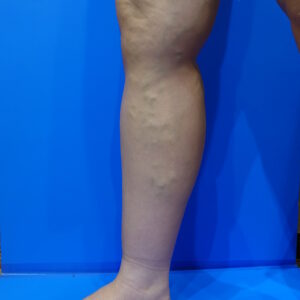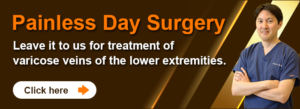Genetics and Varicose Veins: The Risk of Early Onset and Preventive Measures
Introduction
Varicose veins are a condition where leg veins become enlarged and twisted, commonly affecting middle-aged and older individuals. However, when genetic factors play a significant role, varicose veins can develop even in teenagers or young adults in their 20s. Early onset increases the duration of the disease, making it more likely to progress, which is why early preventive measures are crucial. This article explains the risk of varicose veins in younger generations and how to prevent their progression.
Probability of Hereditary Varicose Veins
Statistics show that if both parents have varicose veins, there is a 90% chance of passing them on to their children.
Additionally, if only one parent has varicose veins, the likelihood of inheritance is 62% for daughters and 25% for sons.
Characteristics of Hereditary Varicose Veins
When varicose veins develop due to genetic factors, the following characteristics may be observed:
- Early Onset: While varicose veins are typically seen in people over 40, hereditary cases may present symptoms as early as the teenage years.
- Affects Both Men and Women: While varicose veins are more common in women, genetic predisposition increases the risk for men as well.
- Faster Progression: When varicose veins develop at a young age, the prolonged stress on the veins makes the condition more likely to progress rapidly.
Why Are Young People More Prone to Severe Progression?
When varicose veins develop at an early age, the disease lasts longer, increasing the risk of worsening if not managed properly. The main factors contributing to progression include:
- Cumulative Damage to Venous Valves: The valves that prevent blood from flowing backward weaken over time, causing worsening symptoms.
- Chronic Poor Circulation: Long-term impaired blood flow increases the risk of complications like stasis dermatitis, which can lead to skin discoloration and ulcers. Once stasis dermatitis develops, skin issues may persist throughout life.
- Impact of Standing Jobs: In addition to genetic predisposition, environmental factors, such as working in occupations that require prolonged standing (e.g., the food service industry), can accelerate the progression of the disease.
Preventive Measures for Early-Onset Varicose Veins
Even if you have a genetic predisposition, adopting the right strategies can help prevent worsening symptoms. Incorporate the following preventive measures into your daily routine:
-
Regular Exercise
Activities like walking and swimming help strengthen the leg muscles and improve venous circulation. -
Use of Compression Stockings
Medical-grade compression stockings can prevent blood from pooling and slow the progression of varicose veins. -
Posture and Activity Management
Reduce long periods of standing or sitting, and make it a habit to move your legs frequently. -
Early Consultation with a Specialist
If varicose veins appear at a young age, consulting a specialist while symptoms are mild can lead to appropriate treatment and better outcomes.
Treatment Options
Even if varicose veins progress in younger individuals, various modern treatments are available:
- Sclerotherapy: A treatment that injects a medication into the vein to close it, effective for spider veins and reticular veins.
- Catheter-Based Treatment: Uses laser or radiofrequency energy to seal veins, leaving minimal scarring.
- Glue Treatment: Injects medical adhesive to close the affected vein and prevent blood from flowing backward.
Conclusion
When varicose veins develop due to genetic factors at a young age, the extended disease duration increases the likelihood of progression. However, adopting preventive measures and seeking early treatment can help slow disease advancement. Reviewing lifestyle habits, using compression stockings, and engaging in regular exercise can be beneficial. If you notice concerning symptoms, consult a specialist as soon as possible.
Early detection and early intervention are key to managing varicose veins. Being proactive about your health while young is essential for protecting your future well-being.




